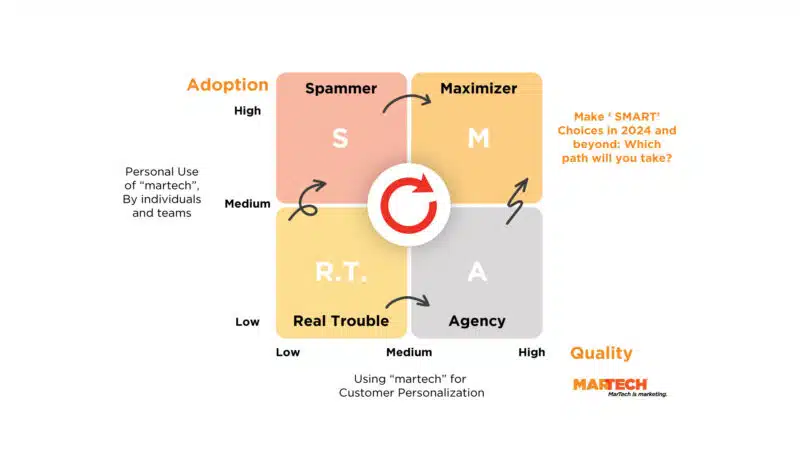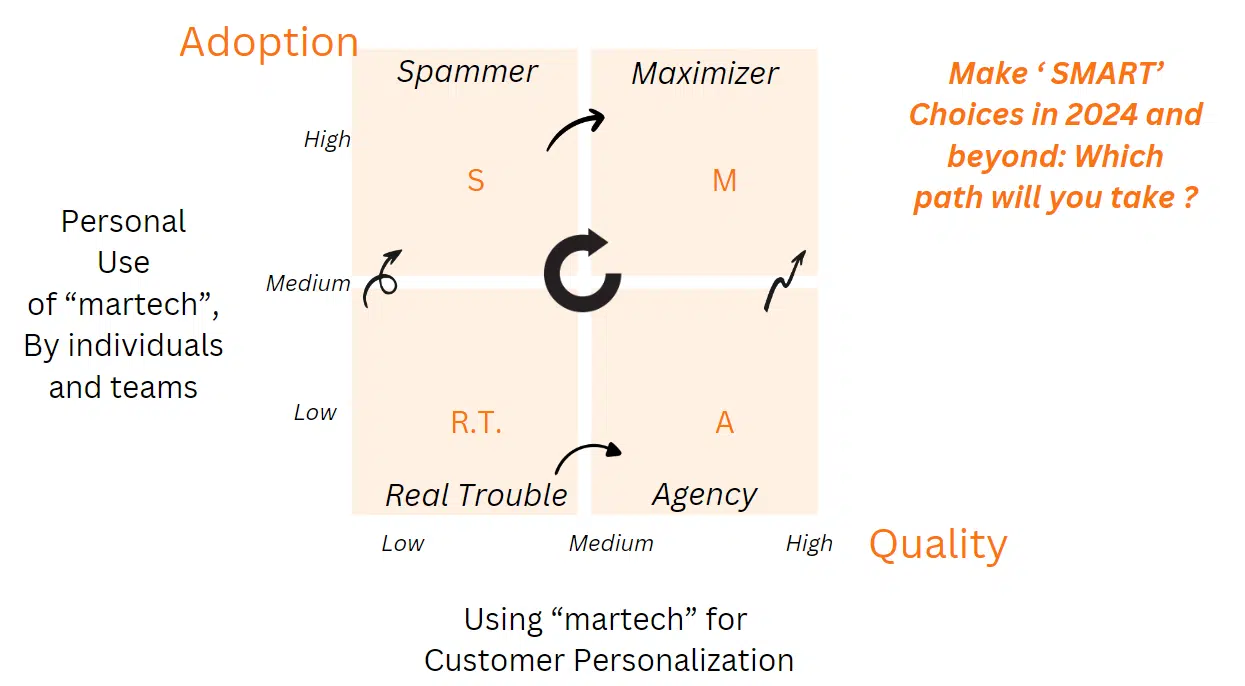How martech leaders must embrace AI for customer-centric marketing
Explore the imperative for martech leaders to personally upskill and embrace AI to deliver true customer personalization in 2024 and beyond.
Everyone is now a martech leader. Depending on your perspective, that’s either a threat or great news. But in 2024, I’m leveraging it as a call to action to focus more attention on personalized experiences for customers.
It was always personal
For more than 10 years, we all enjoyed being on the frontier as martech came into its own, led by leading voices such as Scott Brinker and dedicated thought leaders in this space. Yes, I’m biased, but that includes industry insights you can learn through this site!
For those of us who were early adopters, it was personal. It legitimized our roles, often as a new breed of cross-functional leaders that translated what marketing wanted but didn’t know how to ask for and implemented what traditional IT didn’t have the capacity or capability to do.
But it was never really about the platforms for leading professionals. We focused on the program (campaigns), people and processes first — and then tried to embrace the platforms that enabled those processes.
Increasingly, CMOs hired us as dedicated leaders as marketing became the leading user of tech outside product and IT. We were also hired and empowered to train others who wanted to embrace new skills, technologies and career opportunities because the tech capabilities made you stand out.
Did more martech ‘lead’ to better customer personalization?
We enjoyed being a new breed of tech-forward SMEs. With more than 10,000 tools to choose from, it became all about managing the stack. Our budgets and resources grew as we integrated an ever-growing series of applications.
We then developed into marketing ops leaders, growing our strategic influence by advising the CMO on platforms. We also partnered closely with SalesOps for revenue impact and customer success for customer retention.
But did we ever make a major dent in the promise of much of this tech — to deliver more truly personalized experiences to our prospects and customers?
We made progress by many measures, but we haven’t made a dent in the overall problem. Multiple studies tell us personalization still falls into a basic categorization — delivering content on one basic data attribute, such as age, location or title.
Being addressed by first name in a mass email — table stakes in email personalization — has existed for over 10 years. How many emails are we still getting that reference your name as “hello there” or “everyone?”
Only 22% of shoppers indicate they are satisfied with the level of personalization they currently receive, per Twilio Segment’s 2023 State of Personalization report (registration required).
We have a long way to go.
Despite this lack of improvement in customer experience, we were future-proof because we just needed more investment in martech to achieve that promise. Then AI arrived.

AI will push us to the next frontier of personalization
As early adopters of tech enablement, we rejoiced at this AI influx, not because we understood it completely, but because we built our reputation on the “tech” side of martech.
Throughout this past year, however, we developed a growing realization that AI can make everyone redundant. AI is democratizing martech for everyone. And, you can even argue that it’s democratizing the whole of marketing.
- Want messaging? Want an image? Want a video? Ask ChatGPT or Google Gemini.
- Want to put it all together on a website? Use Wix’s AI-infused templates.
- Want help managing your CRM? Use ChatSpot or Einstein Copilot.
- Want a data analysis? Use ChatGPT’s Advanced Data Analysis.
The clearest measure of this trend came to us recently from the team at the Marketing AI Institute, which surfaced a quote from Sam Altman from the OURAI Journey authors in late 2023:
“AI will handle 95% of marketing work done by agencies and creatives.”
Sam Altman
A call to action for personal adoption
At this time last year, my point of view was that AI would lead to a large re-investment in the core marketing automation platforms (MAPs). That promise has yet to be realized. Instead, it forced me to revisit my assumptions of what a core MAP includes.
A shared Google Doc is part of core MAP, as the origination of what we respond to: content. My Dec. 2023 article showed how platform assistants’ “describe and done” capabilities will help you accomplish even more complex technical integrations.
This point of view crystallized even further — when the trend of AI agents and assistants (i.e., co-pilots) — emerged. Non-technical leaders could use embedded template-based approaches and automate previously complex, training-intensive tasks.
This type of thinking led me to this 2024 series, which I’m reformulating around this point of view:
- This is a call to action to all martech people: We can be better at personalization!
- This is a call to action to all marketers: You are now a martech person!
We — the humans — can still decide, starting in 2024 and beyond
Where in this 2×2 framework will we fall — and will we be SMART with our choices?

Do we continue focusing on the tools? The AI infusion can instantly produce more operational efficiency and quantity than any part of our prior stack. The bottom line: Do we let it enable even more spam?
Do we continue to outsource our personalization to agencies? This will likely be the case for some for the short-to-medium term, as the organizational threat will force CMOs to act.
As a strategic consultant, I am part of the problem and the solution for clients. But I also constantly advise that we bake in enough “train-the-trainer” time.
Also, remember that some of your clients also leverage outside platforms from agencies — due to internal organizational bans and concerns over data privacy.
Even if you turn to agency partners in the short term, you need to raise your personal/organizational knowledge to question what you are being charged for. Some leaders are already questioning the former agency charge model. For example, what is an hour of marketing time spent in light of the AI trends?
Does that mean that agencies are in a bad situation? No, it only means that agency partners that remain in their former models, hired by marketing leaders who don’t invest in themselves and their organizations, will be questioned even further.
I believe all positive roads will truly lead us to be maximizers. We will have no choice but to personally upskill ourselves. You must see/do this independently to understand its transformational impact on marketing and martech.
Real trouble
If we do not personally embrace martech and adapt it for more customer personalization, we are in real trouble (R.T.). We are not future-proofed, so we can also be replaced by AI.
Please join me as I explore these personal vs. personalization trends in 2024.
Opinions expressed in this article are those of the guest author and not necessarily MarTech. Staff authors are listed here.
Related stories